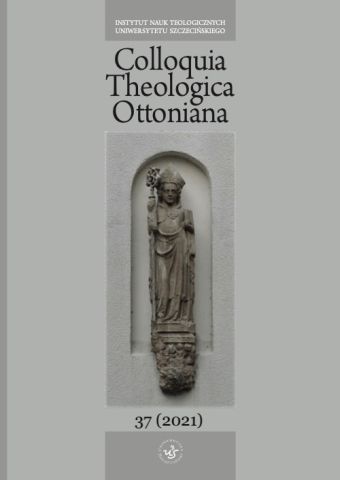
ISSN: 1731-0555
eISSN: 2353-2998
OAI
DOI: 10.18276/cto.2021.37-16




Issue archive /
37/2021
Między karą Bożą a miłosierdziem. O obrazach Boga wobec problemu koronawirusa
(Between divine retribution and mercy: on the images of God in the context of COVID-19)
| Authors: |
Damian
Wąsek

Uniwersytet Papieski Jana Pawła II w Krakowie, Polska |
| Keywords: | coronavirus expiation (in theology) relational theology God and autonomy |
| Data publikacji całości: | 2021-12-15 |
| Page range: | 16 (279-294) |
Abstract
In this article, I pose the question: what theological views did the pandemic trigger, where did they originate, and in what direction should they evolve? In answering this, I highlight the encounter between two images of God – the punishing and the merciful – in the context of distortions in religious commentaries on COVID-19. I first ask: From where does the tendency to treat misfortunes as punishment from God come? Later, I propose an alternative model – God is guided by love. I find it more credible in the face of contemporary Church teaching. In the third step, I characterise the foundations of a model based on God’s autonomy and the world, which – in my opinion – can help provide a correct explanation of the problem of evil. It seems that in the face of evil, the thoughts of religious people are very often directed to God, and in the background of their reflection is the question: For what sins are we suffering this? One of the factors contributing to the shaping of such thinking was the expansion of the expiatory model of Revelation. In many theological statements, and above all in Pope Francis’s teaching, there is a suggestion that the image of divine retribution does not correspond to the intuitions that come from the experiences of faith and other theological sources. Since God is love, he does not strive to destroy creation, even in the face of great ingratitude. One more conclusion can be drawn from this image of a loving Creator. Since he is guided by true love, he should treat the world in a spirit of respect for freedom. Otherwise, this love would be imperfect.
Download file
Article file
Bibliography
| 1. | Anzelm z Canterbury, Cur Deus homo?, PL CLVIII, col. 361–432. |
| 2. | Berger K., Po co Jezus umarł na krzyżu?, przeł. E. Pieciul-Karmińska, Poznań 2004. |
| 3. | Bliźniak G., Konferencja III: Krwawe łzy na Obrazie Jezusa Miłosiernego, https://www.youtube.com/watch?time_continue=711&v=iHgC5udX6Ek&feature=emb_title (dostęp: 23.12.2020). |
| 4. | Boże, lud Twój, https://spiewniksiedleckiego.pl/?page_id=3516 (dostęp: 23.12.2020). |
| 5. | Casula L., Volti, gesti e luoghi. La cristologia di papa Francesco, Città del Vaticano 2017. |
| 6. | Coda P., La Chiesa è il Vangelo. Alle sorgenti della teologia di papa Francesco, Città del Vaticano 2017. |
| 7. | Edwards D., Bóg ewolucji. Teologia trynitarna, przeł. Ł. Kwiatek, Kraków 2016. |
| 8. | Formuła spowiedzi, http://www.katechizmy.com.pl/images/spowiedz.pdf (dostęp: 23.12.2020). |
| 9. | Franciszek, Adhortacja apostolska „Evangelii gaudium” o głoszeniu Ewangelii we współczesnym świecie, http://www.vatican.va/content/francesco/pl/apost_exhortations/documents/papa-francesco_esortazione-ap_20131124_evangelii-gaudium.html (dostęp: 23.12.2020). |
| 10. | Franciszek, Bulla „Misericordiae vultus”, http://www.vatican.va/content/francesco/pl/bulls/documents/papa-francesco_bolla_20150411_misericordiae-vultus.html (dostęp: 10.04.2021). |
| 11. | Franciszek, Posynodalna adhortacja apostolska „Amoris laetitia” o miłości w rodzinie, http://www.vatican.va/content/francesco/pl/apost_exhortations/documents/papa-francesco_esortazione-ap_20160319_amoris-laetitia.html (dostęp: 23.12.2020). |
| 12. | Franciszek, Powróćmy do marzeń. Droga ku lepszej przyszłości. Papież Franciszek w rozmowie z Austenem Ivereighem, przeł. P. Guzik, Kraków 2020. |
| 13. | Franciszek, Scalfari E., Rozmowy z niewierzącym, Kraków 2014. |
| 14. | Franciszek, Tornielli A., Miłosierdzie to imię Boga, przeł. J. Ganobis, Kraków 2016. |
| 15. | Franciszek, Wolton D., Otwieranie drzwi: rozmowy o Kościele i świecie, przeł. M. Chojnacki, Kraków 2018. |
| 16. | Halík T., Czas pustych kościołów, przeł. T. Maćkowiak, Kraków 2020. |
| 17. | Hryniewicz W., Kościół jest jeden. Ekumeniczne nadzieje nowego stulecia, Kraków 2004. |
| 18. | Kasper W., Świadek miłosierdzia: moja podróż z Franciszkiem, przeł. T. Szwemin, Warszawa 2016. |
| 19. | Lambert D., Ryzykowne spotkanie teologii z nauką, przeł. P. Korycińska, Kraków 2018. |
| 20. | Mattei R. de, Nowe scenariusze w epoce koronawirusa. Czy koronawirus to Boża kara? Rozważania polityczne, historyczne i teologiczne, https://www.pch24.pl/roberto-de-mattei--nowe-scenariusze-w-epoce-koronawirusa--czy-koronawirus-to-boza-kara--rozwazania-polityczne--historyczne-i-teologiczne,74675,i.html#ixzz6WKMn6gcS (dostęp: 23.12.2020). |
| 21. | Müller G.L., Dogmatyka katolicka, przeł. W. Szymona, Kraków 2017. |
| 22. | O’Collins G., Chrystologia. Jezus Chrystus w ujęciu biblijnym, historycznym i systematycznym, przeł. K. Franek, K. Chrzanowska, Kraków 2008. |
| 23. | Orędzia z Trevignano Romano, https://odrodzedoprawdy.pl/oredzia-z-trevignano-romano (dostęp: 23.12.2020). |
| 24. | Polkinghorne J.C., Jeden świat: wzajemne relacje nauki i teologii, przeł. M. Chojnacki, Kraków 2008. |
| 25. | Przewodniczący Episkopatu dokonał zawierzenia Polski Chrystusowi i Matce Bożej, https://episkopat.pl/przewodniczacy-episkopatu-dokonal-zawierzenia-polski-chrystusowi-i-matce-bozej (dostęp: 23.12.2020). |
| 26. | Rahner K., Doświadczenia katolickiego teologa, „Miesięcznik Znak” XLIV (1992) 441(2), s. 72–82. |
| 27. | Repole R., Il sogno di una chiesa evangelica. L’ecclesiologia di papa Francesco, Città del Vaticano 2017. |
| 28. | Salij J., Rozgniewany Bóg i Miłosierna Matka, https://opoka.org.pl/biblioteka/T/TD/praca_nad_wiara/rozgniewany.html (dostęp: 23.12.2020). |
| 29. | Serdeczna Matko, https://dziedzictwo.ekai.pl/@@serdeczna_matko (dostęp: 23.12.2020). |
| 30. | Sobór Watykański II, Konstytucja dogmatyczna o Objawieniu Bożym „Dei Verbum”, w: Sobór Watykański II, Konstytucje. Dekrety. Deklaracje, Poznań 2002, s. 339–362. |
| 31. | Wagner H., Dogmatyka, przeł. J. Zychowicz, Kraków 2008. |
| 32. | Werbick J., La debolezza di Dio per l’uomo. La visione di Dio di papa Francesco, Città del Vaticano 2017. |